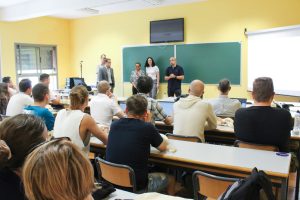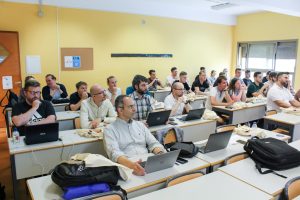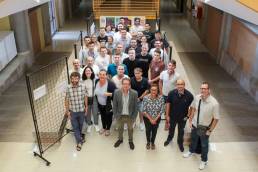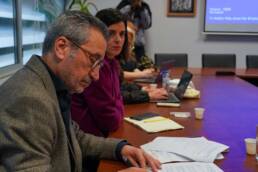Twenty five students from eight universities in seven European countries will complete this week at the University of La Laguna the in person part of a BIP course on Smart Grids promoted by the STARS alliance.
Specifically, the course is one of the results of the Thematic Interest Group on Energy Transition coordinated by the ULL. This teaching proposal had a course load of 6 ECTS credits and was structured in four modules: Sustainable low-carbon technologies in the electricity system; Digitalisation (and sensorisation) of electricity grids; Modelling and computation of power systems; and Operation and control of (micro) smart grids.
 In the first session of the course, held today Monday 12 June in a classroom of the School of Engineering and Technology, these European students were welcomed by the Vice-Rector for Internationalisation and Cooperation, Inmaculada Pérez; the Director of the Secretariat for Mobility and Cooperation with Europe, José Sigut; one of the professors of the course, Santiago Torres; and the coordinators of this BIP: Benjamín González, from the University of La Laguna; and Ângela Ferreira, from the Polytechnic Institute of Bragança (Portugal).
In the first session of the course, held today Monday 12 June in a classroom of the School of Engineering and Technology, these European students were welcomed by the Vice-Rector for Internationalisation and Cooperation, Inmaculada Pérez; the Director of the Secretariat for Mobility and Cooperation with Europe, José Sigut; one of the professors of the course, Santiago Torres; and the coordinators of this BIP: Benjamín González, from the University of La Laguna; and Ângela Ferreira, from the Polytechnic Institute of Bragança (Portugal).
During the welcoming ceremony, the academic authorities thanked the students for their effort to come to Tenerife, a distant destination for many of the participating people. Professor Benjamín González also valued the commitment of these students to this project because, as he pointed out, the energy transition is one of the most immediate challenges facing society, and the young people who are taking this training today will be the experts who will have to solve it in the future.
During the week that these students remain at the University of La Laguna, they will participate in various group problem-solving activities, presentations by guest speakers, and also visit different university facilities, such as the BiblioLab, and external ones, such as the Technologic Institute of Renewable energies (ITER).
 Apart form ULL, three other intuitions belonging to the STARS EU alliance have also participated in the organisation of this BIP, such as the Hanze University of Applied Sciences (Holland), the Crakow University of Technology (Poland) and the Bremen University of Applied Sciences (Germany). They have also been joined as co-organisers by the Slovak University of Zilina.
Apart form ULL, three other intuitions belonging to the STARS EU alliance have also participated in the organisation of this BIP, such as the Hanze University of Applied Sciences (Holland), the Crakow University of Technology (Poland) and the Bremen University of Applied Sciences (Germany). They have also been joined as co-organisers by the Slovak University of Zilina.
Although this BIP course is promoted by STARS EU, its call was open to institutions outside the alliance. Thus, students from two Polish institutions (Cracow University of Technology and Konin University of Applied Sciences), one Czech (University of Hradec Králové), one Hungarian (University of Nyíregyháza), one Finnish (Novia University of Applied Sciences), and the co-organisers Bragança Polytechnic Institute, University of Zilina and University of La Laguna attended the meeting at the University of La Laguna.
Related Posts
February 6, 2026
Celebrate the International Day of Women and Girls in Science with STARS EU
The alliance demonstrates its commitment to full and inclusive participation of…
February 3, 2026
Bragança Polytechnic University and University West strengthen their strategic cooperation in research and doctoral training within STARS EU
The meeting addressed the implementation of joint doctorates and the connection…
January 30, 2026
Education to address new challenges, focus of the third STARS EU Annual Conference
The next event will take place in March 2026 at the Silesian University in…




